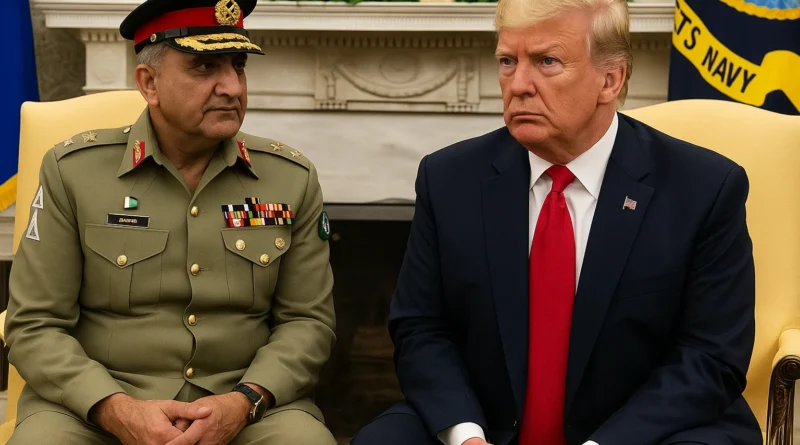Trump Hosts Pakistan Army Chief Munir in Unprecedented White House Meeting Amid Regional Tensions
Washington D.C., USA – In a highly unusual diplomatic move, U.S. President Donald Trump hosted Pakistan’s Chief of Army Staff, Field Marshal Syed Asim Munir, for a luncheon meeting at the White House on Wednesday, June 19, 2025. The meeting, which marks the first time a sitting U.S. President has formally received a Pakistani Army Chief who is not also the head of state, covered a range of critical geopolitical and economic issues.
The unannounced nature of the meeting, which was reportedly arranged through “unorthodox efforts” rather than routine diplomatic channels, immediately drew significant attention, particularly in India. Accompanying President Trump were Secretary of State Marco Rubio and U.S. Special Representative for the Middle East Steve Witkoff, while Munir was joined by Pakistan’s National Security Advisor and head of the ISI, Lt. Gen. Asim Malik.
Key Discussions: From Regional Conflicts to Trade
The discussions between President Trump and Field Marshal Munir touched upon several pressing matters:
- India-Pakistan Conflict: A central theme of the meeting was the recent de-escalation of tensions between India and Pakistan in May 2025. President Trump effusively praised both Munir and Indian Prime Minister Narendra Modi for their roles in averting what he described as a potential “nuclear war” between the two “big, big nuclear powers.” Trump asserted, “The reason I had him here was that I wanted to thank him for not going into the war, ending the war (with India). And I want to thank PM Modi as well.” This statement, however, stands in contrast to India’s consistent position that the ceasefire was achieved through direct military talks and no third-party mediation.
- Iran-Israel Conflict: Amidst the escalating conflict between Iran and Israel, both leaders had a “detailed exchange of views.” President Trump noted that Pakistan “knows Iran very well, better than most,” and that Munir “agreed” with his assessment of the situation. Pakistan’s Army, in its statement, emphasized that both leaders “emphasised the importance of resolution of the conflict.” Munir also reportedly conveyed concerns about the potential for separatist and jihadi militants on the Pakistan-Iran border to exploit any instability in Iran, advising against “any collapse of authority in Iran.”
- Trade and Economic Cooperation: President Trump expressed “keen interest in forging a mutually beneficial trade partnership with Pakistan based on long-term strategic convergence and shared interests.” Discussions encompassed expanding bilateral cooperation in domains such as economic development, mines and minerals, artificial intelligence (AI), energy, cryptocurrency, and emerging technologies. This signals a potential shift in U.S.-Pakistan economic engagement, moving beyond traditional aid.
- Counter-Terrorism Cooperation: Both sides reaffirmed their commitment to continued collaboration in the field of counter-terrorism. President Trump lauded Pakistan’s ongoing efforts for regional peace and stability and appreciated their robust counter-terrorism cooperation.
Signals and Reactions
The meeting is being widely interpreted as a significant moment in the evolving U.S.-Pakistan relationship, potentially indicating a reset in ties that had seen a period of strain. From Pakistan’s perspective, the invitation is seen as a major diplomatic success, with Pakistani Defense Minister Khawaja Asif calling it a “historic milestone” and a success for the “current hybrid model of governance.” Munir also extended an invitation to President Trump to undertake an official visit to Pakistan.
However, in India, the meeting has raised eyebrows. Congress leader Jairam Ramesh termed it a “huge blow” to Indian diplomacy, questioning the protocol of a US President hosting an Army Chief who is not a head of state. India has maintained that its ceasefire with Pakistan was solely due to direct military talks, not U.S. mediation, a point Prime Minister Modi reportedly clarified to Trump in a phone conversation on Tuesday night.
The White House had earlier stated that President Trump was meeting Field Marshal Munir after the latter reportedly called for Trump to be nominated for the Nobel Peace Prize for preventing a nuclear war between India and Pakistan. This unprecedented direct engagement between the U.S. President and Pakistan’s military chief is expected to have far-reaching implications for regional geopolitics.

